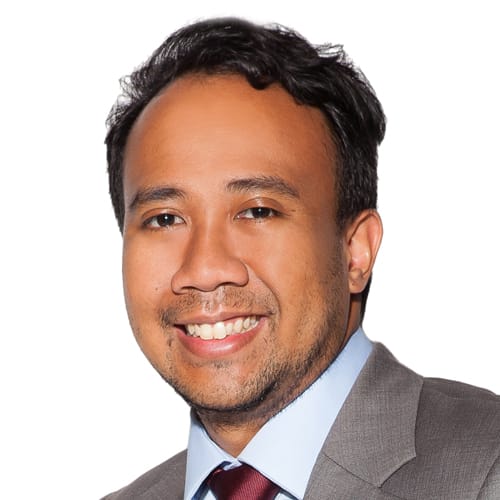Repeat offender determined to be a good dad after jail term made him miss daughter's birth
Rebuilding family ties after a spell in prison can be challenging, but organisations like Jamiyah Halfway House can help ex-offenders rediscover how to be good parents.
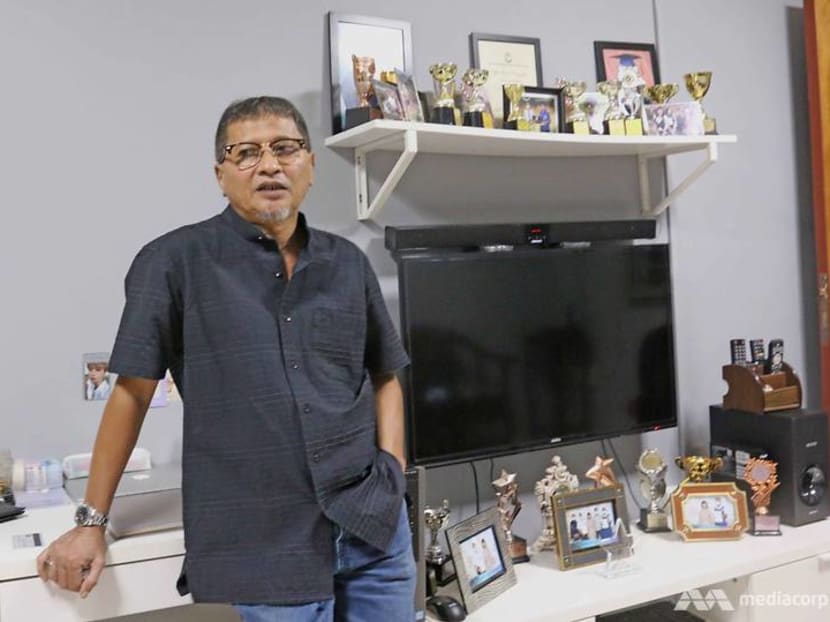
Mr Yaakob Ismail is trying his best to be a good father to his two daughters. (Photo: Aqil Haziq Mahmud)
SINGAPORE: In December 2007, Mr Yaakob Ismail went to prison for the seventh time. All of his sentences were for drug consumption, and the latest stint, this time for five years, was no different.
But there was something profoundly different. This time, Mr Yaakob's wife was pregnant with their second child. And she was due to give birth a few months after he went in.
He recalled feeling tortured knowing he would miss most of his daughter's growing up years, as he tossed and turned in his cell at night thinking about how his family was coping without him.
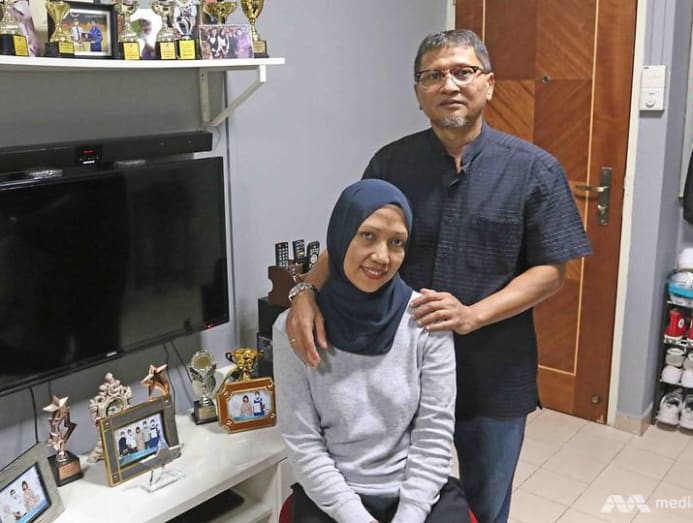
Still, Mr Yaakob, now 60, tried to be a good father from prison.
He baked cakes with his daughters during parenting programmes, allowed them to get the latest gadgets when they got good grades, and motivated them to do better in life when they came to visit.
"Inside, I did a lot of counselling, reflection and soul searching, and I found that nowadays, I am not alone and I have a family to take care of, so it’s not wise," he told CNA at his three-room flat in Bukit Batok.
But a few years after he got out, he made the same mistake again.
Mr Yaakob was caught for drug consumption once more, and in 2015 was sentenced to seven years in jail. His wife and kids were angry, disappointed that he went back on his word.
Mr Yaakob was resigned to losing them. He told his wife he would accept it if she wanted to go her own way. But she gave him one last chance, wanting to keep the family together.
"I felt very bad because I gave them an empty promise," he said. "When my wife said she will wait for me, I thought I have to somehow change my life for the better."
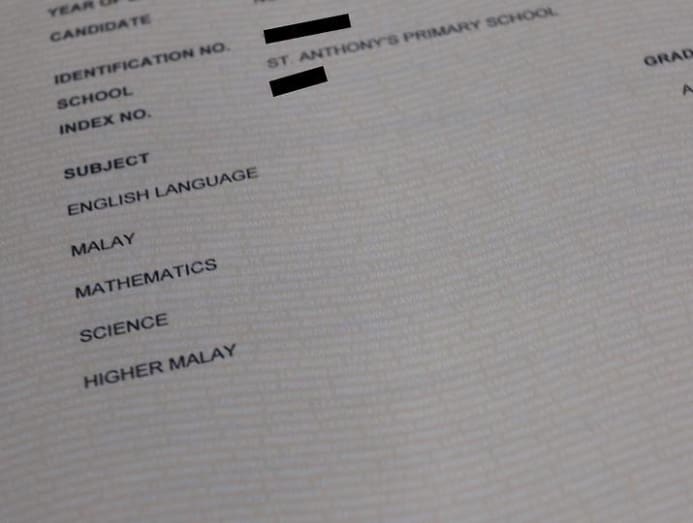
Mr Yaakob again spent his time in prison trying to be a better father.
His daughters wrote to him, telling him not to worry as they would study hard. The younger one excelled in primary school and eventually the Primary School Leaving Examination (PSLE), earning an outstanding achievement award.
When he moved to the Jamiyah Halfway House at the tail end of his sentence, he actively participated in its family programmes and gave back to the community through its initiatives.
While many stories have been told of former inmates who struggle with rehabilitation or otherwise make it good in life, it is rare to hear about how they rekindle their relationship with their children.
Jamiyah Halfway House recognises these challenges and helps residents rebuild family ties. For instance in December last year, the halfway house worked with Mendaki to organise a robotics workshop for residents and their children.
"This friendly exchange of ideas and knowledge between father and child will hopefully assist the pair in reconnecting after spending a long time away from each other," the halfway house said.
Mr Yaakob was released from the halfway house in April last year, and said he is determined not to re-offend to be there for his children.
"I love them so much and I don't want this thing to be repeated, because their patience is limited," he said.
"I might not know how they will react next time, but I don't want that to happen to my family. When I see a broken family, I ask myself if this happens to me, how? Can I take it, can my children take it?"
MISSING HIS DAUGHTER'S BIRTH
For Mr Yaakob, family life only really started in 2005, when he tied the knot with his wife. Before that, he had gone to prison six times as a single man.
In 2006, the couple welcomed their first daughter. Mr Yaakob would buy many gifts for her on his often two-week long overseas work trips. At the time, he produced corporate videos for different companies and events, earning "good" money.
Before he started his sentence in 2007, he told his daughter he was going away for a long time. She said she was okay with that as she knew he would bring back a lot of presents.
"I said no, I'm going to prison," he recalled saying. His daughter was stunned. "For what?" she retorted. "My wrongdoing. I took drugs," came his reply.
Mr Yaakob said his daughter refused to believe it at first, as she had not seen him taking the drugs. When he said he never did it in front of her, she began crying. "How am I going to go to school?" she said. "My friends will know."
READ: Inmate stressed by long sentence, family's disappointment finds comfort in supportive prison officer
Then a few months later on Apr 15, 2008, he stepped into the office of his rehabilitation officer in prison to sign his second daughter's birth certificate.
His daughters were born two years apart but coincidentally on the same day and month, something Mr Yaakob speaks fondly about.
But the following weeks were tough as he thought about how he was not around to see his daughters growing up.
"I feel bad for them because of my doing," he said. "When students go to school and perform in a concert or graduate, they will see their parents down there.
"But for them, only my wife will accompany them and I am not around. That's the sad part. I know how they feel, how hurt they are."
Mr Yaakob also worried that his younger daughter would not recognise him as his family was living with an aunt and her husband. Their Bukit Batok flat was being rented out to support the family.
"(I thought) my baby would only know the other side as parents, but actually my elder daughter kept showing her pictures of me and said this is daddy," he said.
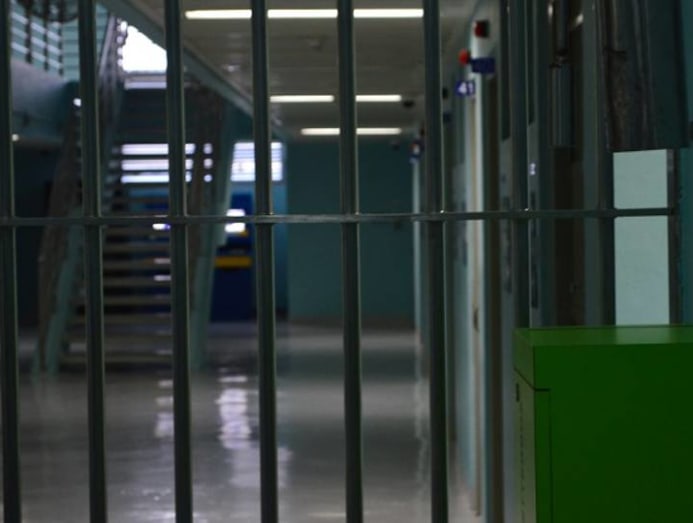
When his younger daughter was about nine months old, she was brought to visit him in prison for the first time. The baby had trouble recognising him, only choosing to look at him.
Mr Yaakob had mixed feelings after finally getting to see and hold her. "I was very happy and excited, but sad because I was unable to be with her," he said.
In the months and years that followed, Mr Yaakob made it a point to bond with his daughters whenever possible. Physical visits happened once every two weeks, while letters came about twice a month.
READ: Regret over how he treated inmates: This former prison warden has been counselling them for 15 years
During counselling sessions in prison, Mr Yaakob listened as he was told to control his temper. He took part in fathering programmes that allowed inmates to engage in fun activities with their families.
"What I learnt about fathering opened up my mind," he said. "I came to a conclusion that when I am in anger, I can't analyse what is right and wrong."
So when his elder daughter told him not to be angry and vowed to do better before revealing her grades, he never scolded her.
"Whatever you do today, make sure you do it much better tomorrow," he recalled telling her. "I told her to study hard, not for me or mum, but for your own good and future. I motivated them like that."
FALLING BACK INTO THE VOID
After Mr Yaakob got out of prison, he reunited with his family without issues and returned to his video producer job. "Everything was okay," he said.
Then things took a turn for the worse.
As Mr Yaakob was on his way to a coffee shop to get some food, he bumped into an old friend who had just finished buying 4D numbers at a Singapore Pools outlet.
READ: ‘I want to change … and I need help’: The repeat drug abusers on a mission to stay clean
After chatting for a while, they shook hands. Mr Yaakob was shocked to feel a lump of heroin in his palm. He tried to tell his friend he was not into it any longer, and that he was going abroad for work.
His friend insisted that he have it, and asked him to call after he returned to Singapore. Mr Yaakob decided not to go to the coffee shop as he felt it was too dangerous with the drug, so he went home.
"I was triggered and the urges came back," he said, adding that he smoked some of the heroin when he got back. "That's it. I relapsed."
Mr Yaakob said he never did drugs in front of his kids, but his wife sometimes caught him doing it.
"My wife said: 'What if anything happened to you? It won't be easy for me. Who am I going to cling to?'" he said.
READ: More admitted to drug rehab centre in 2019, driven by changes in law aimed at reducing relapse
Mr Yaakob spent thousands of dollars going through different therapies locally and overseas to wean off his drug addiction. This helped him stop using various drugs, but heroin proved to be a problem.
Then sometime in 2015, Mr Yaakob visited a friend in need to pass him some forms for community assistance. When Mr Yaakob left the house and went downstairs, he was arrested by Central Narcotics Bureau officers.
It turned out that Mr Yaakob's friend was dealing drugs, something he did not know about. After his urine tested positive for drugs, his world came crashing down again.
"At first the officers thought I was supplying drugs to my friend, but I had nothing on me," he said. "They said you always kena caught wrong place, wrong time."
READ: IN FOCUS: Breaking the cycle of drug addiction passing from parent to child
Mr Yaakob tried to look at the positives, thinking that he would strive to finally stop his addiction during his latest stay in prison.
"It’s not easy for me as an addict to stop overnight," he said, pointing out that he started taking drugs when he was young and first went to jail for it in 1978. "But I believe this time, I can manage."
GETTING ANOTHER CHANCE
Mr Yaakob's Indonesian wife Dewi Kurniati, 38, said she was furious when he said he was going in again.
"The first time, I was shocked and I didn’t really know much about it," she said. "The second time, I was more angry because he did it again and the kids are still young."
But Ms Kurniati, who works as a cashier at a polytechnic, said she never thought of leaving him despite his offer, highlighting that she wanted to give him another chance.
"I just want my children to be together. I told them to give dad a chance because we are a family," she added.
"I don't want them to be distracted at school. I always bring them to visit their father whenever possible as I don't want them to be distant from him. They've not missed a visit."
READ: Inside the women’s prison: Empathy, rigour and help to turn inmates' lives around
Mr Yaakob's younger daughter, now 13, said she could not remember details of her dad's previous stint in prison, but this one was clearer.
"The three of us were sitting together in the room when my mum told us what happened. I was disappointed, shocked and scared as well," she said.
"When he was still inside, I still saw him as my dad. After every time we met him, I would always cry after going back."
Ms Kurniati said their elder daughter would sometimes get teased in school, but she advised her not to worry and care about these people.
"She turned down student counselling because she felt more friends will know about it," she added. "My daughters have been strong."
DOING PARENTING RIGHT
Looking back, Mr Yaakob said he is thankful that his wife chose not to leave him.
"I'm grateful because she stuck through all the hardships, and it’s not easy for her to face all these things because she’s a foreigner," he said, noting that she is here on a long-term visit pass.
READ: ‘Doing the right thing has never been easy for me’: A serial convict’s journey
While in prison, Mr Yaakob's elder daughter wrote to him to say that while she forgave him this time, things would be different if it happened again.
"What encouraged me is that they told me not to worry and that they will study hard for the family," he said.
Mr Yaakob joined the fathering programmes in prison again, this time as a leader to other inmates. During the half-hour family visits, he made sure he got to speak to his wife and daughters personally in allocated times.
When his daughters asked if they could go for the Korean pop group BTS' concert or get the latest iPhone, he said they would need to pass their exams first.
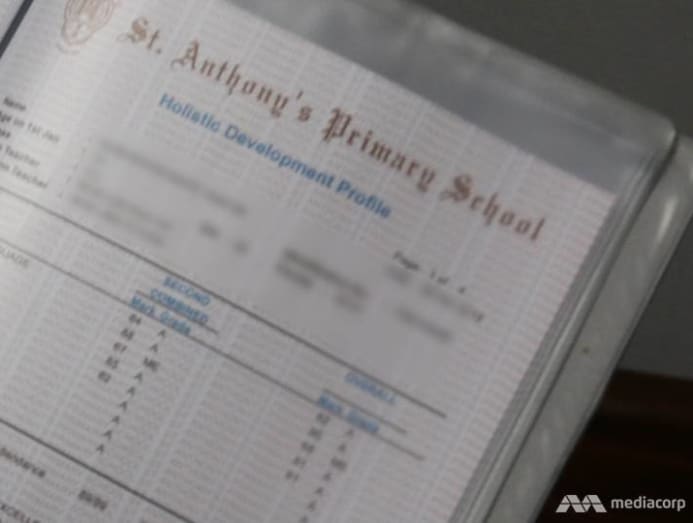
Mr Yaakob soon found out that his younger daughter was doing exceptionally well at St Anthony's Primary School. He remembered seeing his rehabilitation officer's look of surprise after handing him his daughter's results slip.
It was her Primary 5 end of year overall results, and it was filled only with As.
"People in prison with broken homes, their child usually cannot do well (in studies)," Mr Yaakob recalled the officer saying. "But your daughter is doing well. You better don't come in again and take care of them."
Mr Yaakob advised other inmates who are missing their children to be open with them, treat them as friends and not push too hard.
"I always tell my wife to motivate the kids and not punish them by using your hands," he said. "I don't want them to be scared of me, but I want them to respect me. I want them to share their problems with me."
GIVING BACK TO SOCIETY
Mr Yaakob served the final year of his sentence at the Jamiyah Halfway House, where he took part in community initiatives like cleaning houses and distributing food for the needy.
When there was opportunity to take leave, he went home to spend time with his family, going out for nicer meals that his daughters said they will pay for.
Mr Yaakob completed his sentence in April last year, saying he has more resolve than ever not to re-offend.
"If I have any problems (with drugs), I will immediately call some people at Jamiyah," he said. "We have brothers down there and we keep in touch."
READ: Prisons exploring use of digital platforms to help ex-offenders better reintegrate into society: Shanmugam
Mr Yaakob said he feels blessed to have this kind of support, adding that he still volunteers with the halfway house during the weekends.
Current and former residents take part in online fathering workshops or outdoor activities with family members, like cycling at East Coast Park.
The community programmes have also spurred Mr Yaakob to continue giving back. He now works in a nursing home caring for the elderly.
"Every day I shower them and change their diapers; in this job you need to show love, care and concern," he said.
"At the same time, it will make you humble. Some with dementia will shout at you and test your patience, so we must always cool them down."
At home, Mr Yaakob said he will spend "quality time" with his children twice or thrice a month by cooking together. Dishes include burritos, tortillas and butter chicken rice.
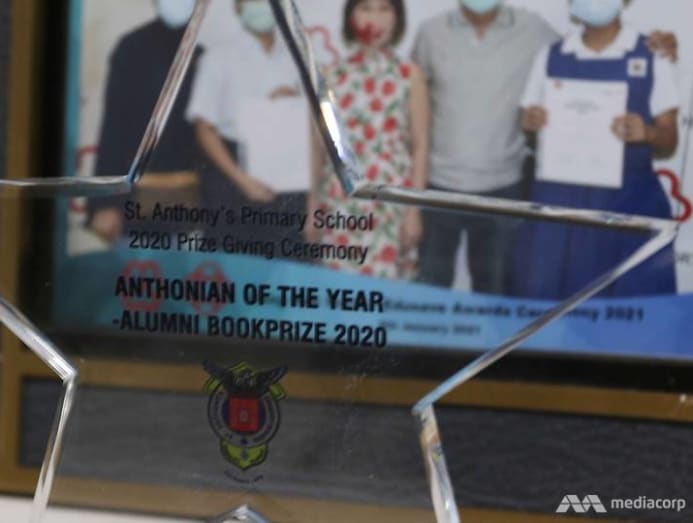
Mr Yaakob's daughter said she hopes her dad will stay clean and cut down on smoking, calling it "distracting".
After she did extremely well for her PSLE, she was named student of the year among her Primary 6 cohort for her accomplishments in different fields. She was asked to give a speech, but virtually due to COVID-19.
Mr Yaakob insisted on showing a YouTube clip of the speech, despite his daughter's objections. "Daddy, don't. I'm shy," she pressed.
But Mr Yaakob, beaming throughout, was just being a proud father who was showing off his daughter's achievements.


